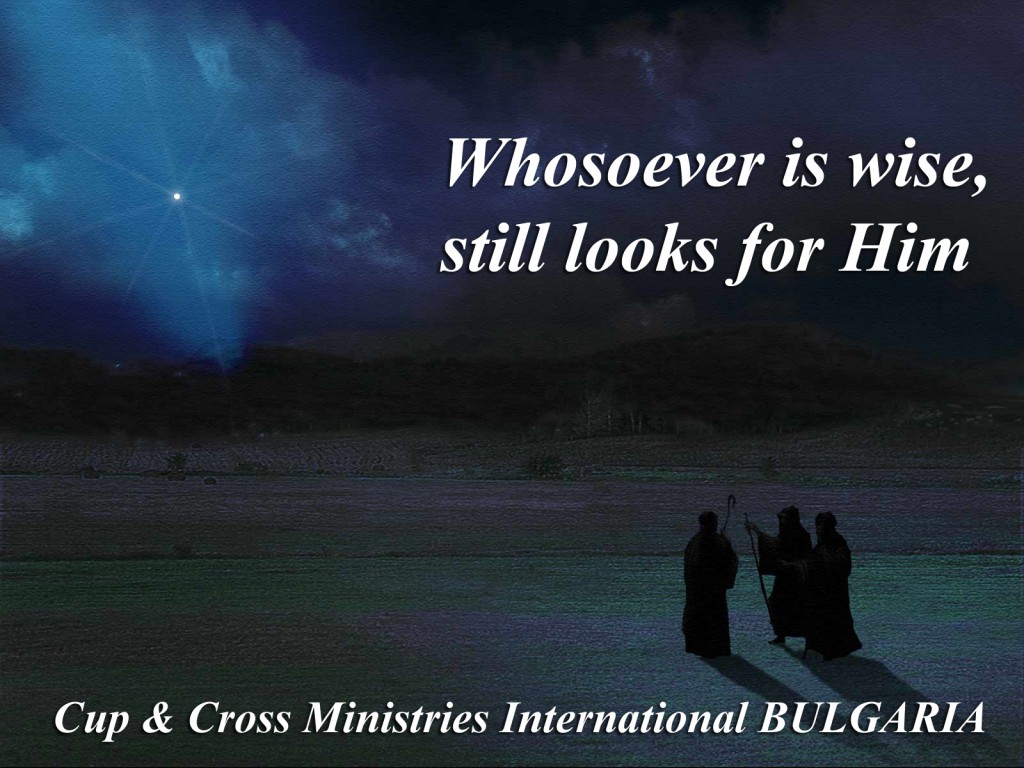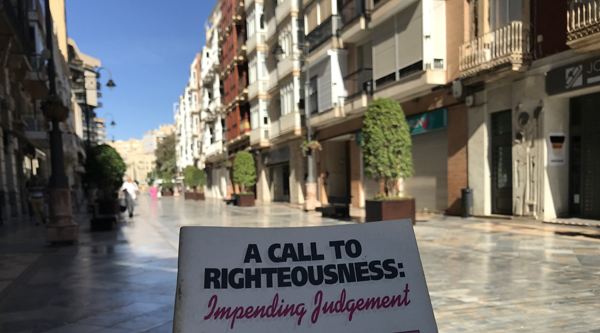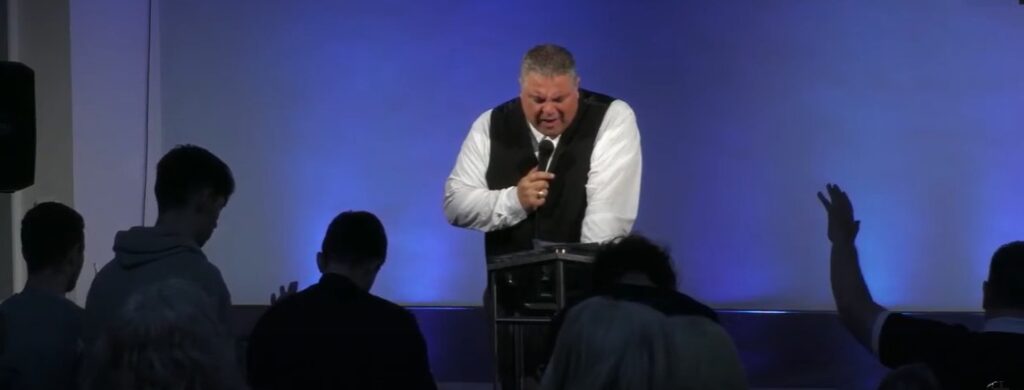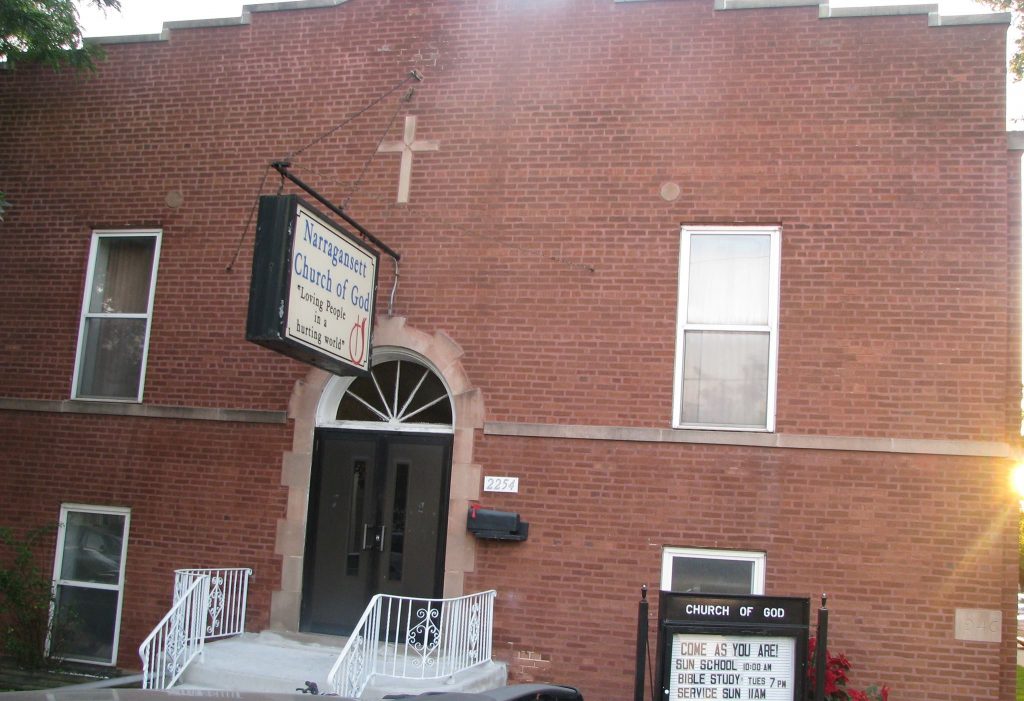30 Years ago in Chicago…
Exactly 30 years ago today, I arrived in Chicago with a plan to start a Bulgarian church. That was my second trip to the Windy City after a mission’s trip with a few college friends in Christmas of 1994. The Narraganset Church of God in Chicago hosted us with great success and it was there I met several Bulgarians who desired to start a church. A key moment still remembered from 1994 was the “boot sermon.”
On Memorial Day weekend of 1995, I drove my Carolina baby blue Buick Grand National exactly 777 miles north to Chicago. It was still the time of no GPS or phone navigation so the only thing I had to go buy was an old atlas. Not knowing a better way just yet, I didn’t take the North-West Suburbs but exited on North Avenue and ended up driving its whole length through the city. On a warm Sunday the entire population of Wicker Park was in the streets. It was like in the movies. So was the rest of the Summer of 1995.
I had made little arrangements for my stay and ended up with a Bulgarian family living on Jackson Blvd. For the lack of space, I slept on an old couch on their balcony. Yes, during the Chicago heat wave of 1995.
I stayed with the pastor’s family a lot, especially when we started our 5 a.m. prayers in the church for members who would stop by to be prayed for before going to work. Some of those nights I just stayed at the church and slept on the first pew before the altar. It was there one early morning God woke me with the whole Gospel of John open before me, which later became the plan for my Bible translation.
As to the start of the Bulgarian church in Chicago, it came naturally as part of the ministry. The small band of Bulgarian believers would come for the English-speaking morning worship and then stay for a Bulgarian service in the early afternoon. A Spanish-speaking service followed at 4 P.M. as well. Several key events through the summer like the now-traditional Bulgarian 4th of July picnic in Chicago and a block party organized by the Narraganset Church of God helped spread the word of our Bulgarian ministry. Soon migrants of all ages began attending the afternoon services.
The most I remember from those services was prayer. Yes, I preached and there were guest speakers as well, but we mostly prayed. Bulgarians of all ages would come to the alter with their life pain and needs. Deep hurt within immigrant hearts, missing family members left behind in the old country, new struggles with work and existence in their new migrant reality and so on – all became a part of the new life of the Bulgarian church in Chicago. And those prayers were answered one by one. People did not come to attend or become members of a church plant project. They came and found answer to their prayers, direction in their lives and healing for their deep pain. Hidden from everyone else in Chicago, a river of pain flowed at those old church alters and a rain of healing, hope and peace filled the emptiness in those emigrant souls. That much I do still remember.
Through the whole summer as the Bulgarian church in Chicago began, I wrote my parents every Friday. Two regular stamps were what it took for a letter to get to Bulgaria back then. I would walk from the church on Narraganset across the street to Grand and drop the letter in a blue street U.S. mailbox. They all got to their destination. My dad had stored them all in an old shoe box after reading them, and I was able to find them all recently. They ain’t no diary, but still tell the story with details of each week of those humble beginnings. Along with the letters, there were a lot of pictures I had taken with my small 35mm. camera that looked more like a taser. The Metro, Sear’s Tower and under it where we ministered to the homeless, South Side and Cabrini Green, Rigley Field and Comiskey Park, McCormick and LSD. I only wish I had taken better notes now that I am writing this book. Times, places and faces are often mixed and sometimes lost in the timeline, but the story is far from forgotten. Now, a quarter of a century later, it is time to tell this story and tell it right… for the generations.
I left Chicago on this day 25 years ago (July 30, 1995). The Bulgarian church that day held service at 1 PM with 64 Bulgarians and many other internationals in attendance. Bulgarian students from the neighboring Indiana and Wisconsin attended as well. There was even a Bulgarian family from Alaska.
It was a Sunday. I left Chicago to preach in Beloit, WI that night and then left for Washington, D.C. the following morning. While driving north with quite the speed my Carolina blue Grand National began filling with white smoke. At first, I thought the air conditioner was on its last leg in the hot Chicago summer of 1995, but the air remained strong and cold. The cloud proceeded and it was so sensible that I had to slow down and basically stop on the side of the road. In my 30 years of ministry, I have only seen this one more time – in 2011 when the Glory of God descended over a youth camp we were preaching in the Bulgarian mountains. I did finally preach in Beloit and made it to D.C. the next day, but the vision of the cloud remained with me for the next 25 years.
Meanwhile, the word of mouth had spread and the Bulgarian church in Chicago was growing among the Bulgarian diaspora. On October 7, 1995, I was able to visit the church in Chicago again and present it to the National Overseer of the Bulgarian Church of God, Pastor Pavel Ignatov who visited the Bulgarian congregation in Chicago for the first time. By that time, it has become evident that the initial structuring for growth was giving more than expected results. The church became not only the first officially registered Bulgarian Pentecostal congregation in the United States, but also an important social and educational center able to minister to the 100,000 Bulgarians that live in the Great Lake region today.
Called to another mission, I left Chicago on July 30, 1995. The church bulletin upon my departure under Farewell and Appreciation read: “Today we are saying thank you to Dony for a job well done this past summer. He has served our church faithfully, and has been a tremendous blessing to Narragansett Ministries. Immediately following worship this morning, there is a dinner in Dony’s honor in the fellowship hall. And everyone is invited to attend.” Quiescently, while writing this next book for the quarter century anniversary of the Bulgarian Church in Chicago, I was able to find this last bulletin in a box with several dozen letters I had sent weekly to my parents in Bulgaria. Surprising even to myself, those letters contain pictures, documents, dates, growth charts and progression predictions that are surprising even to me today. I remember spending countless nights in prayer, contemplating and strategizing over the new Bulgarian church plant, but I had forgotten all this was carefully documented as a case study.
The church congregation presented me with a plaque that represented my efforts and work in Chicago, which I have also kept until now. Because this plaque represents the prayers and the vision of many who are continuing the work today, establishing and leading Bulgarian churches around the world to providing pastoral care for many who have left the homeland in search for a better life. To these ministers goes my personal token of appreciation and thanks, “Well done thou good and faithful!” For me personally today a quarter of a century later, this plaque represents one very simply thing – I never betrayed my dreams. And in my book, this is well done…
Appreciating the Simple Things in Life
 Roasting chestnuts over an open fire and Jack Frost nipping at your nose is a comforting carol which brings many pleasant feelings around the holidays. These are two features, which are not only common to the States, but to Bulgaria as well. This is the season of chestnuts being roasted, however it is not like we picture being over a cozy fire place in a warm home. In Bulgaria it would be on the street side to sell in order to bring in some income for your family. And the Jack Frost is not just a nip for some, but it is a bone chilling cold due to not being able to afford the electric bill.
Roasting chestnuts over an open fire and Jack Frost nipping at your nose is a comforting carol which brings many pleasant feelings around the holidays. These are two features, which are not only common to the States, but to Bulgaria as well. This is the season of chestnuts being roasted, however it is not like we picture being over a cozy fire place in a warm home. In Bulgaria it would be on the street side to sell in order to bring in some income for your family. And the Jack Frost is not just a nip for some, but it is a bone chilling cold due to not being able to afford the electric bill.
For some, there will be no gift under the tree and for others there will not even be a tree. This is not said to bring you sorrow, but for you to appreciate the simple things in life. Enjoy family, friendships, a warm home, a hot meal, your health. Enjoy the time the Lord has given you and use it for his Glory and not for bickering or complaining over the small angst.
Don’t loose sight of the true meaning of Christmas. Christmas is not about the material, but it is about the spiritual. It is about the birth of our Lord and Savior even though our politically correct society wants to get ride of the “Christ” in “Christmas.” If it were not for His birth, He would not have been able to die for our sins. This remission of sin is the ultimate gift this Christmas season for it is through this act that we are able to have eternal life if we only ask.
So when you wake up on the 25th begin your day not consumed with what you didn’t get or what didn’t happen to your liking, but in silence remembering the silent and holy night over 2000 years ago. Remember those less fortunate in order not to take for granted with what you have been blessed. And most of all thank Him for His gift to you. Let these thoughts bring you comfort this holiday season.
Merry CHRISTmas 2009
From all of us in Bulgaria!
The Unrealized Spiritual Harvest of Bulgarian Churches in North America
 ….A closer examination of the ministry and structure of the network of Bulgarian churches in North America will give answers to essential issues of cross-cultural evangelism and ministry for the Church of God. Unfortunately, until now very little has proven effective in exploring, pursuing and implementing cross-cultural paradigms within the ministry opportunities in communities formed by immigrants from post-Communist countries. As a result, these communities have remained untouched by the eldership and resources available within the Church of God denomination. There are presently no leaders trained by the Church of God for the needs of these migrant communities. Thus, a great urban harvest in large metropolises, where the Church of God has not been historically present in a strong way, remains ungathered. Although, through these communities, the Church of God has the unique opportunity to experience the post-Communist revival from Eastern Europe in a local Western setting… (p.84, Chapter III: Contextual Assessment, Historical Background, Structural Analyses and Demographics of Immigration in a Paradigm for Cross-Cultural Ministries among Migrant and Disfranchised Ethnic Groups in America Today) Read complete paper (PDF)
….A closer examination of the ministry and structure of the network of Bulgarian churches in North America will give answers to essential issues of cross-cultural evangelism and ministry for the Church of God. Unfortunately, until now very little has proven effective in exploring, pursuing and implementing cross-cultural paradigms within the ministry opportunities in communities formed by immigrants from post-Communist countries. As a result, these communities have remained untouched by the eldership and resources available within the Church of God denomination. There are presently no leaders trained by the Church of God for the needs of these migrant communities. Thus, a great urban harvest in large metropolises, where the Church of God has not been historically present in a strong way, remains ungathered. Although, through these communities, the Church of God has the unique opportunity to experience the post-Communist revival from Eastern Europe in a local Western setting… (p.84, Chapter III: Contextual Assessment, Historical Background, Structural Analyses and Demographics of Immigration in a Paradigm for Cross-Cultural Ministries among Migrant and Disfranchised Ethnic Groups in America Today) Read complete paper (PDF)
How to Start a Bulgarian Church in America from A-to-Z
A Call to Righteousness over Spain
December 15, 2024 by Cup&Cross
Filed under Featured, News, Publication

3 Decades Later: Evangelical Education in Bulgaria at Halt
With the new Bill on Religion in Bulgaria, the Muslim community has been given amnesty on some $4,500,000 of public debt, while granted another $3 million in annual government subsidies. As a result, the monthly salary of Muslim clergy (imams) has already increased with 20% and a new Islamic school is being opened in one of the historically oldest Christian places in Bulgaria, the city of Sliven. All while, the evangelical protestant communities are not receiving financial support under the new law and their schools remain without proper government legalization via the Bulgarian Ministry of Education.
Though this legal precedent follows the Russian Law on Religion that has already effectively closed the evangelical seminaries in Moscow, it is manifesting a political agenda undergoing in Bulgaria for over a decade. What remains unsaid with the recent changes in the Law of Religion in Bulgaria is the ultimate halt of evangelical education in the country. The Bulgarian Evangelical Theological Institute has been functioning at its operational minimum for years now. Students are trained mainly online or via small local groups spread in various cities. They are called to the school departments only for graduation or occasionally lectures by visiting scholars. Even after years of waiting, the Institute was never granted official accreditation through Bulgaria’s Ministry of Education and most of the students preferred getting their degrees from other accredited and licensed institutions. Less than 1% of the students who were not in ministry at the time of their enrollment entered the ministry post graduation. And even fewer of them remain in ministry today; which ultimately ensures the lack of adequately trained ministers for placement in the evangelical churches of Bulgaria.
The last Bulgarian to graduate from the Church of God Theological Seminary did so over a decade ago, and 2009 was the last class of the Bulgarian Theological College (seminary). One of the greatest mistakes made was closing the college in 2009, thus leaving the movement with virtually no higher ministry training for the last decade.
We were present at the national meeting of elders on September 10, 2009 in Sofia when the final decision to close the Church of God Theological College was voted. Only a few others along with us disagreed with the vote and pleaded with the assembly to make everything possible and keep the school open. At the final vote, it came down to a few thousand dollars due in annual membership fees and the school was closed.
Five years prior to these events in 2004, we published an article on evangelical education in Bulgaria with some warnings. The article proposed a change of the evangelical educational paradigm in anticipation of new legal changes and the prolonged waiting for a governmental accreditation. In fact, the same issues addressed in our proposal repeated themselves in 2016 upon Russia changing its own legislation on religion and religious education thus effectively illegalizing evangelical seminaries and overall missionary work. Today, similar legal measures are put in place by the Bulgarian government as well.
The final of our 10-point proposed plan in 2004 included the following observation:
- Naturally, the well-educated graduates have chosen not to occupy themselves with denominational politics both to avoid confrontation and to express their disagreement. This dynamic has been partially ignored by leadership remaining from the period of the underground church when religious education was virtually nonexistent and lacking a complete realization of the power of education. This unnoticed trend, however, endangers Bulgarian Evangelism creating a lack of continuity within the leadership and preparing the context for the emerging leadership crises.
With the new Bill on Religion in Bulgaria closely following the effective closure of evangelical seminaries in Moscow, the opportunity for a government recognized ministerial training in Bulgaria may be legally impossible to regain. In the light of those resent changes, our 2004 proposal for a legal ministry training alternative was successfully implemented and used for our Master of Chaplaincy Ministry graduates since 2009 providing a single valid alternative for evangelical education in Bulgaria.
Missions for the Third Millennium 15 Years Later
The time of changes in the world of missions is at hand. The search for a new paradigm for doing missions in the beginning of the 21st century has begun. Much like in the world of the internet, it cannot be a closed-circuit reinstallation of the same old software, which changes the interface, but not the structure; or a copyrighted etalon designed to be used by a tender legal minority. It must be an open-source, people oriented, social networking, body-like organism of believers that practice the Bible providing the diakonia of missions to peoples and nations in a need of salvation.
This necessity for a fresh evaluation of the way we do missions in the Spirit is based on issues which older missional paradigms were unable to adequately address. Rethinking of world missions today, includes rethinking the global problems of economic crises, world terrorism, immigration and open border markets. Problems that point not to new frontiers in some unknown cosmic future, but back to the old countries upon which modern day civilization was built.
Churches and missionaries, then, cannot afford to simply follow any secular, political, social or economical wave, but must propose Biblical solutions, which surpass both the understanding and history of the natural world to the realm of the Kingdom of God – the sole solver, provider and proprietor of the restoration of God created humanity, social justice and every relationship within the universum for eternity.
It is there, in the very Kingdom identity, or the lacking of such thereof, that the problem of ministry in missions is found. And this problem is deep, penetrating the very soul and make of the church, changing it from a community of mission minded believers willing to dedicate their lives to missions, to an agency that sends half-prepared, half-sponsored, half-aware missionaries to a mission filed where cultural, leadership and financial dilemmas hit them as a hurricane and never seize to oppose their call to minister in a foreign land.
Several characteristics are apparent immediately. The ministry of missions in the 21st century must be:
1. More mission minded than agency structured
2. More missionary focused than leadership centralized
3. More operational than organizational
4. More result oriented than self and strategy containable
5. More praying than thinking while more feeling, than cognitive
6. More giving than fundraising oriented
7. More focused on the Dominion of the Kingdom, than the denomination.
A proposal of such caliber must begin simultaneously at three starting points. First, perhaps not by importance, but by legal requirement, a professional counsel is a must. Many mission agencies follow the secular practice of debriefing missionaries, who have been on the field for a long time as part of their reentry. It is expected that post-missional experiences are often defined as problems requiring a professional counselors. But there are so many more cultural, financial, leadership, church and purely structure related problems. For example, how can one ever imagine doing missions in the 21st century without assertive financial planning in difficult times and rapidly changing international currencies, or political and security advisory in times of ever-present global terrorism? If addressed properly by in-house professionals beforehand, most of them can and should be easily prevented in the ministry of the missionaries. Thus, released from the burden of solving problems they are not qualified to deal with, missionaries will be allowed to fully focus on their main goal: namely, the salvation of eternal human souls.
Second, but equally important, are some very practical implications concerning the church recognition of the ministry of the missionary. Unfortunately, even in the beginning of the 21st century, some of the leading Pentecostal denominations in the world do not have the ministry of missions present on their ministerial report forms, as if it simply does not fit there. Others are yet to include missions as a ministry occupation on their voting registrations for business meetings at assemblies.
And finally, a word about the Prophetic Utterance of Pentecostal Missions. Historically, we, the missionaries baptized with the Holy Ghost, seldom followed models and paradigms. Our guidance has been that prophetic Word, that utterance of the Spirit, that divine guidance and Heavenly call that are never wrong. We went without knowing. We prayed without ceasing. We prophesied without seeing in the physical or even purposefully refusing to reckon with it. We preached without a season, for preaching was the vibe of our ministry and the life of our churches. And this made us Pentecostal. Even more important, this made us powerfully Pentecostal and Pentecostally powerful.
And if indeed, it is true that this very power is being lost today, it means that the very identity of our movement has changed from power giving to power needing – from powerful to powerless. The main questions that must be raised then are these: “What is the prophetic word for Pentecostal missions in 21st century?” and “What does the Spirit wants us to do?” And their answers could be found in the restoration of Pentecostal preaching, prophecy and prayer, as the foundation of any paradigm or model on which we continue to build the Ministry of World Missions.
Reflections on a 200-day Revival

- Creative developing of fasting, prayer and giving of alms, all commanded by Jesus Himself as a regular expression of our faith (Gr. оταν = when you pray, fast, give), is the prerequisite for every Spirit-led revival. On the third day of our 10-day fasting, God used a child to revive our dead Volvo, which no mechanic in a radius of 200 miles could crank for over 6 months.
- The church that forced-left the building during the pandemic, has now returned to multimillion-dollar buildings where God did not choose to start a 200-day Revival. And even when He did, the move was shut down for lack of parking space or nightly supervision. In all actuality, a church building is a result of a revival, its finish and its end. An association with a place, address or location is a sign of its centralized settlement. It was the forced getting-out of a church building (as in Acts 7) that caused the Great Azusa Revival to emerge as a grass-root movement engraved in the streets of LA.
- Revival must emerge from the Desire and Will of God in order to be supernaturally visited by the Power of His Glory! It cannot be approached as a man-made multiplication initiative, be it local, national or globally dimensioned. It is not a project to involve people, but a spiritual tsunami of power, authority and anointing that invites a prophetic projection of what God desires for eternity and not merely what man needs in the now.
- When the now and then align, revival sparks. When the now has lost its sight on eternity, revival is long done and gone. The remain is but a motion imitating the wave of the Spirit Who has already moved to other more receptive spiritual trenches and valleys of humbleness. It is these societal peripheries and spiritual layers that God visits first with Revival before proceeding to the center of religious life. Meaning, the Heart of God for Revival is not in a religious center. As a matter of fact, any association with external centralized governing denies God’s centrality in what the Spirit wills from His Church. A man cannot vanquish the ocean and cosmos of space!
- We can win no soul Christ has not already won at the Cross! We should not try to empty hell to fill Heaven, lest we end up in hell ourselves.
A final word to fundraisers who turn revival into a business-like know-how: Can’t buy God’s love!
On day 175 of our Revival, I drove by a building close to our ministry’s home location and it caught my eye. Newly built, large enough, specious parking, perfect location easily reachable from at least three large city regions. An ideal place to hold our large revival meetings in my human perception. Quite naturally, I stopped the car in front of the beautiful gate and began telling the Lord how great would it be to continue the revival here. My reasons were many. No need to travel hundreds of miles to just preach one time, spend the night in strange places, walk in the ankle-deep mud-covered streets of slums and ghettos just to reach a soul. They could all come here, park, gather, worship, hear the Gospel, be saved, healed and delivered. The same way we had seen already in the revival for almost 200 days in a row. My heart’s thoughts were shut down by one brief word from the Lord: I did not choose to have it THIS way…











